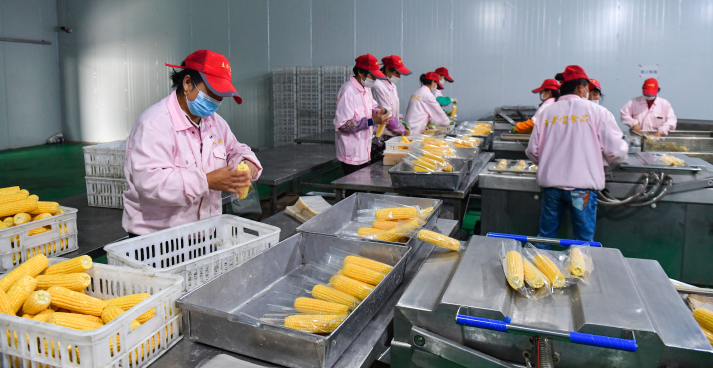Golden Green Farms
Beijing Review,November 03, 2018 Adjust font size:
Black soil and soybeans
Liu Chunsheng, Secretary of the CPC Branch of Dongxing Village of Hailun, Suihua City in Heilongjiang, is also planning something big for the village. Having worked at his current position for the past 13 years, Liu is familiar with everything about the village.
"There are 14,252 mu (950 hectares) of farmland in the village with 787 households," Liu said. "In the past, each household dealt only with its own farmland, which, in a way, is a waste of labor and is inefficient."
In 2012, Liu initiated a cooperative to gather the farmland for collective farming. To date, all households in the village have joined. The cooperative deals with every step of the process, from sowing the seeds to harvesting. The village cooperates with DJI, a Chinese company that makes unmanned aerial vehicles (UAVs), throughout the process.
"We have a training base for young villagers to learn the skills needed to use UAVs," Liu said. "The training is all for free and takes 10-15 days. After grasping the skill, one can earn 20,000 to 30,000 yuan ($4,411) during the summer alone." Each year, every household gets a share of the profits from the crops in addition to the regular rent from their farmland.

A worker processes corn at a factory in Xiangyang Village of Zhaodong on September 29 (WEI YAO)
"We are planning to build the village into a big community integrating farmland, industry and living areas," Liu said. "We have already created the draft design for this project."
Hailun, known as the capital of the mineral selenium due to its selenium-rich black soil, is ideal for growing soybeans. A trading center in Hailun, which is supposed to go into operation by the end of the year, will be a major trade center of its kind in China.
"Since 2016, we have organized several tours that publicize our selenium-rich agricultural products to other areas in China," Guo Changsheng, Director of the Office of Selenium Industry of Hailun, said. "The supplement of selenium is beneficial to health, and it could help to prevent cancer."
Since February, the tour team has signed contracts with seven cities with contracted volume surpassing 350 million yuan ($50.4 million) by the end of July.
"Our products have been well received by the market and our green and healthy products are expected to be on the table of more families soon," Guo said. (By Yuan Yuan)
cdfa6700-55c1-4239-ae3c-2327248faf90.jpg)
